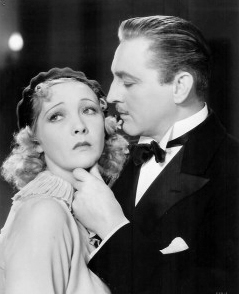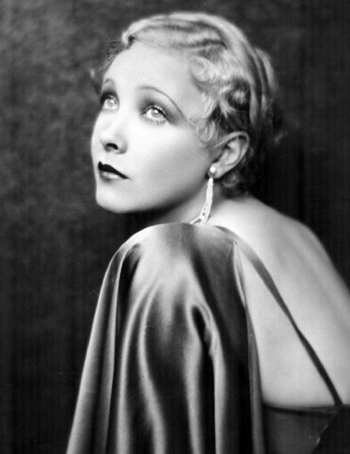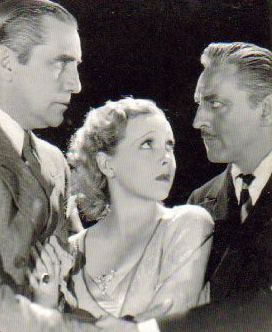
 |
|
|
|
Hmm, let me see ... the WAC (Warner Archive Collection) keeps doing things right as regards the wonderful & provocative world of Pre-code cinema. This week's entry is a vehicle for the bigger-than-life AC-TOR John Barrymore. Reviews old and new are quick to pounce on Barrymore's somewhat stagey, bombastic acting style, but the truth is that he keeps the 1932 potboiler State's Attorney alive and vigorously kicking for eighty entertaining minutes. One of the original "slick lawyer" morality plays, the story by Louis Stevens, Gene Fowler and Rowland Brown couldn't possibly have been approved after the enforcement of the Production Code. It dares to show a beautiful but financially challenged woman openly living with a wealthy man. Neither of them is punished with a horrible death, not even a dose of leprosy. This bald-faced sin was foisted on an innocent public living under the illusion that nice people never do such things. 
State's Attorney has a pretty lax attitude toward a number of touchy subjects, beginning with police corruption. Debonair, womanizing lawyer Tom Cardigan (John Barrymore) began as a petty burglar opposite his boyhood pal Vanny Powers (William Boyd), and is now the go-to guy whenever Powers, now an established racketeer, needs an assist in the courtroom. A functioning alcoholic, Tom balks when Vanny's speakeasy is raided, but helps a girl Vanny knows, June Perry (Helen Twelvetrees). June has been nabbed for prostitution for tapping at a window to a passerby. 1 Tom sway's June's jury with an emotional plea filled with lies about June's virtue and hokum about mother love. June and Tom hit it off, and she moves into his palatial high-rise townhouse. Not soon after, Tom is given the job of District Attorney, and surprises his mob contacts with the news that he's going to prosecute crime honestly. Vanny is not pleased but gives Tom some slack. One night, in a drunken party mood, Tom marries the reckless socialite Lillian Ulrich (Jill Esmond), and the heartbroken June disappears into the streets. But later she witnesses the murder of Vanny by a rival hood. June knows that testifying against the killer will earn her a death sentence from the underworld so she stays clear of Tom. But he persists, realizing not only that he must do the right thing, but that his background makes him unfit for high office. 
State's Attorney is a delightful mix of 'shocking' Pre-code cynicism and high minded morality. Tom Cardigan must resolve a double thread of conflicting attitudes. He is a playboy to the core and impetuous enough to marry a girl just for the hell of it, when he's already got one (incredibly hot) number stashed away at home. Tom has spent his entire career schmoozing juries, flattering judges and more or less making a mockery of the law for the benefit of clients like Vanny Powers that pay him outrageous fees -- like $5,000 to run down to night court to defend June Perry. Tom doesn't bat an eye when he's told that the D.A. job can be an effortless springboard to the Governor's Mansion. The rackets have the town (presumably New York) so wrapped up that nobody is going to question his illicit relationship with his new live-in girl friend. Helen Twelvetrees is quite good, and William Boyd and Lillian Ulrich effective, but the show belongs to John Barrymore. Before the more serious turn of events in the last act, every scene seems to end with Tom Cardigan delivering a wisecrack about sex, prohibition or the general corrupt atmosphere. Barrymore slouches and purrs in bars, and goes all histrionic on us when parading in front of a jury. Some critics may have confused Barrymore's acting overall with Tom's exaggerated dramatic gestures while defending obviously guilty clients. It is true that Cardigan's final speech/confession to the courtroom is almost as hammy as his grandstanding defense tactics. But who goes to a Barrymore movie to see understatement? The production is pretty standard for an RKO picture of its year -- dark interiors slightly less atmospheric than Warners' and less glamorous than MGM's. The gundown on the sidewalk is nicely blocked. RKO's money appears to have gone into Cardigan's Manhattan townhouse, that has an entryway and main room with soaring second floor balconies and a ceiling perhaps 30 feet high. It looks like a warm-up for one of the studio's later Astaire-Rogers musicals. 
Even before the Code was enforced, studios wary of reactionary local censors stopped making films featuring glamorous gangster "heroes". But they compensated with "gangster adjacent" stories, including various Mob Mouthpiece movies like State's Attorney. Another popular Pre-code was actually called The Mouthpiece, but the best remembered example is Ben Hecht and Charles MacArthur's Crime Without Passion, in which a cynical attorney played by Claude Rains openly boasts that his skill can overturn any open-and-shut case. When the cases get tougher he starts planting evidence. Crime Without Passion was released after the Code deadline, and the censors trimmed several scenes, including a fantastic (and frightening) poetic opening montage. 
The Warner Archive Collection's DVD-R of State's Attorney is in stunning shape, even without a "remastered" tagline. One of the reasons we associate murky images and scratchy sound with films from around 1932 is that the popular titles frequently shown on TV were over-printed to the point that few good film materials remain. Something like State's Attorney may have languished in a vault for years after having been retired for its 'morally unsuitable' themes. After a couple of 16mm negatives were struck for TV use, it's probably seldom been touched again. Therefore, thanks to good storage and good luck, it's survived in great shape.
On a scale of Excellent, Good, Fair, and Poor,
State's Attorney rates:
Footnote:
1. I guess we're meant to infer that some prostitutes got the attention of prospective customers on the sidewalk by tapping at windows and inviting them inside .... this was obviously before cell phones.
Reviews on the Savant main site have additional credits information and are often updated and annotated with reader input and graphics. Also, don't forget the 2011 Savant Wish List. T'was Ever Thus.
Review Staff | About DVD Talk | Newsletter Subscribe | Join DVD Talk Forum |
| ||||||||||||||||||